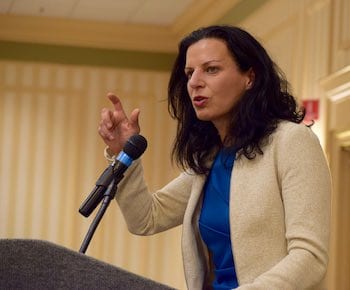
CNN Contributor Juliette Kayyem discusses security issues at Labor Relations Seminar Oct. 27
Building resilient systems and dealing with marijuana use by employees were among the topics discussed at the Massachusetts Municipal Personnel Association’s annual Labor Relations Seminar on Oct. 19 in Boxborough.
Keynote speaker Juliette Kayyem, a national security analyst on CNN, outlined the five attributes of a resilient system at the local level.
1. Build redundancies into local government cyber networks so that officials can still communicate with the public during outages.
2. Plan for any contingency and be able to pivot for any event.
3. Have the capacity to rebound.
4. Install adequate failsafe systems.
5. Use “after action” reports and recognize where you went wrong in order to improve.
“We will not be safe from everything,” Kayyem said. “We are better off as communities to build resilience.
“There is a movement toward resiliency. We tend to think of this as a mood. … but it’s actually investments in ourselves and our structures and our teams ensuring we are best prepared for when the ‘boom’ happens.”
She said Hurricane Katrina in 2005 prompted a “course correction” within the security community that resulted in the development of “three pillars” of homeland security.
The first pillar is the obligation of government at all levels to minimize risk. Kayyem acknowledged, however, that in “a nation like ours with the flow of people, goods and ideas, you’re not going to get it to zero.”
The second pillar is to maximize defenses – “assume the bad thing will happen.”
And the third is to continue to “maintain who we are as a nation, as communities.”
She said the pillars apply to all levels of government, as well as within our own homes.
Attorneys Leo Peloquin of Collins, Loughran & Peloquin and Bryan Decker of Decker & Rubin discussed recent developments surrounding the use of medical marijuana by employees and expectations for future cases.
The session discussed Chapter 151B, the state anti-discrimination law, and an ongoing private sector case in the Supreme Judicial Court regarding the use of medical marijuana. The attorneys said the takeaway from the Barbuto case is that the use and possession of medically prescribed marijuana is as lawful as any other prescribed medication.
They said there needs to be an interactive process between employer and employee regarding reasonable accommodation and the issue of undue hardship.
“The knee-jerk reaction of, ‘We don’t need to talk with you, we don’t need to accommodate you,’ is where employers get into trouble,” Peloquin said. “Avoid overreacting. It’s going to be an interactive process [for accommodation] that you follow.”
Peloquin said federal policy on marijuana “doesn’t save you as an employer.” (Despite a growing number of state laws allowing the legal use of marijuana, the substance is still considered illegal under federal law.)
“Nobody is saying you can come to work impaired,” Decker said. “There is no tolerance for that in the medical law, case law, or with recreational.
“The thing medical marijuana does, is it creates an opportunity for an employee to self-identify, which brings into play the ADA [Americans With Disabilities Act] rubric and reasonable accommodation.”
Managing use by employees at the municipal level is complicated by the use of any federal grants. The Federal Drug-Free Workplace Act requires recipients of a federal grant to “have a policy requiring a drug-free workplace.” So how does that work when an employee has a medical marijuana card, Decker asked.
The federal law does not require testing – much less firing – such an employee, he said. But the law is less clear in cases where an employee self-identifies and the employer knows.
There are additional concerns for public safety personnel, particularly police, because of federal license-to-carry regulations that prohibit the use of marijuana or even acting in a caregiver role under the statute.
Attendees raised questions relating to fire programs that include call-back or 24-hour shifts, and Commercial Drivers License holders. Cases concerning public safety employees are less clear, the attorneys said.
“Should we classify marijuana like we do cocaine?” Decker said when discussing pre-employment drug testing. “Should we treat medical marijuana like prescription opioids? These are questions you are going to want to start asking.”
Labor Relations Seminar attendees included municipal human resources professionals as well as police and fire chiefs.
